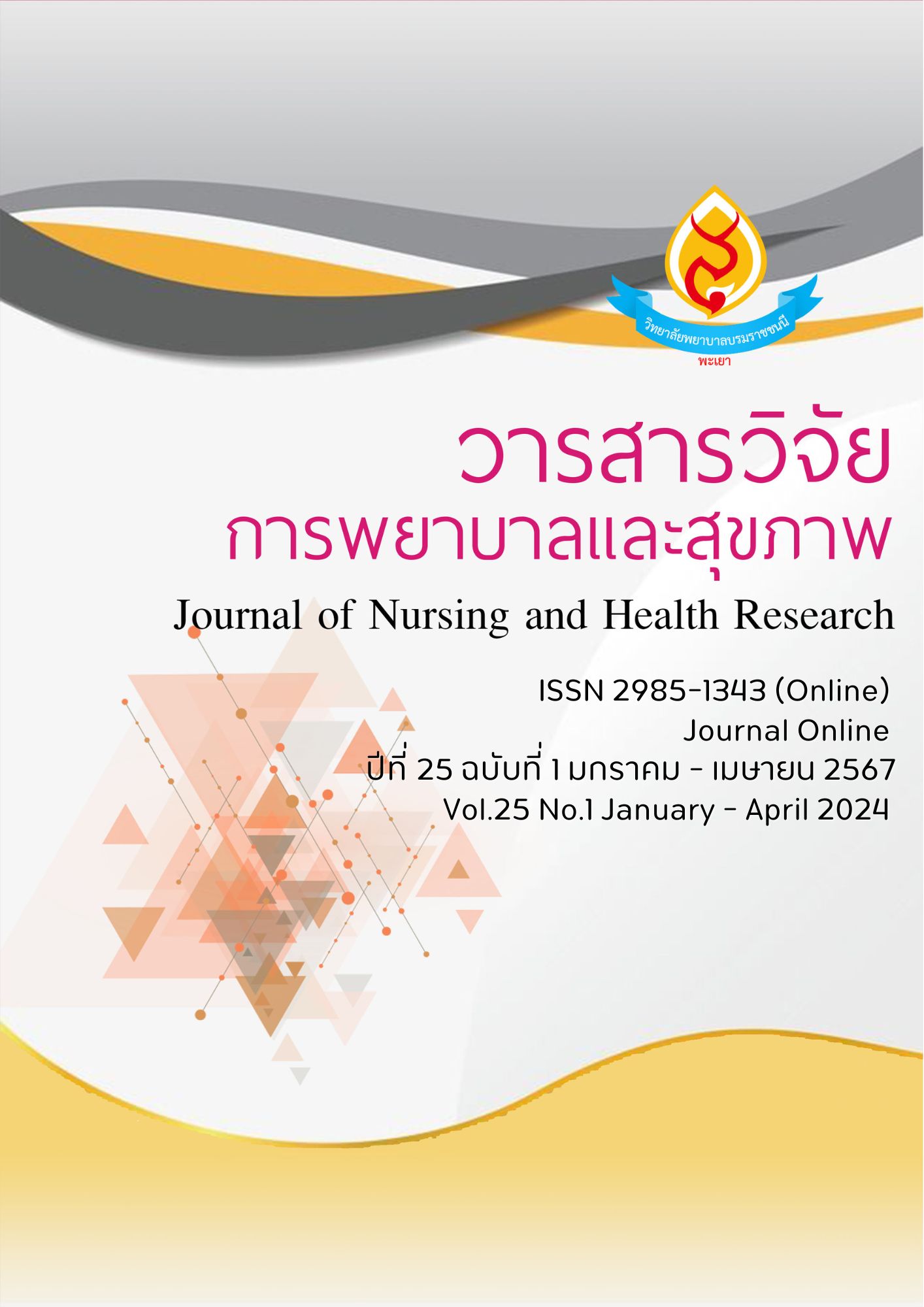การทำหน้าที่ของครอบครัว ทักษะชีวิต การสนับสนุนทางสังคม และปัญหาสุขภาพจิตของผู้รับบริการที่ศูนย์ให้คำปรึกษาในมหาวิทยาลัย: การศึกษาเชิงทำนาย
คำสำคัญ:
ปัญหาสุขภาพจิต, ศูนย์ให้คำปรึกษา, ทักษะชีวิต, การทำหน้าที่ของครอบครัว, การสนับสนุนทางสังคมบทคัดย่อ
การศึกษาปัจจัยที่ส่งผลต่อสุขภาพจิตของนิสิตที่เข้ารับบริการในศูนย์ให้คำปรึกษา คือ ข้อมูลสำคัญในการให้ความช่วยเหลือ และป้องกันปัญหาสุขภาพจิตของนิสิตในมหาวิทยาลัย การวิจัยเชิงทำนายนี้ มีวัตถุประสงค์เพื่อศึกษาอิทธิพลของปัจจัยส่วนบุคคล การทำหน้าที่ของครอบครัว ทักษะชีวิต และการสนับสนุนทางสังคมที่มีผลต่อปัญหาสุขภาพจิตของนิสิตที่ศูนย์ให้คำปรึกษา กลุ่มตัวอย่างคือ นิสิตที่ศูนย์ให้คำปรึกษา ปีการศึกษา 2565 จำนวน 230 คน เครื่องมือที่ใช้ในการวิจัย ได้แก่ แบบสอบถามข้อมูลส่วนบุคคล แบบคัดกรองปัญหาสุขภาพจิต General Health Questionnaire ฉบับภาษาไทย (Thai GHQ–28) แบบสอบถามการทำหน้าที่ของครอบครัว แบบสอบถามทักษะชีวิต และแบบสอบถามการสนับสนุนทางสังคม ทดสอบความเชื่อมั่นของเครื่องมือได้ค่าสัมประสิทธิ์แอลฟาของครอนบาคเท่ากับ .84 .93 .89 และ .92 ตามลำดับ วิเคราะห์ข้อมูลด้วยสถิติถดถอยพหุคูณแบบขั้นตอน ผลการวิจัย พบว่า ทักษะชีวิตด้านการตระหนักรู้ในตนเอง เกรดเฉลี่ยสะสม และการทำหน้าที่ของครอบครัวด้านการสื่อสาร ร่วมกันทำนายปัญหาสุขภาพจิตของนิสิต ร้อยละ 16.2 อย่างมีนัยสำคัญทางสถิติ (p<.01) ดังนั้นศูนย์ให้คำปรึกษาควรจัดกิจกรรมหรือโครงการฝึกอบรมทักษะชีวิต ให้ครอบคลุม โดยเฉพาะด้านผลการเรียนของนักศึกษา การตระหนักรู้ในตนเองและการสื่อสารในครอบครัว เพื่อป้องกันปัญหาสุขภาพจิตของนิสิตที่เข้ารับบริการในศูนย์ให้คำปรึกษา
เอกสารอ้างอิง
กรมสุขภาพจิต. (2563). คู่มือโปรแกรมทักษะชีวิต สำหรับนักศึกษาอาชีวศึกษา. กรุงเทพมหานคร: บียอนด์ พับลิสชิ่ง.
ถิรนันท์ ผิวผา, นุชนาถ บรรทุมพร และ สารรัตน์ วุฒิอาภา. (2561). ผลของโปรแกรมการฝึกทักษะชีวิตต่อภาวะซึมเศร้าในนักเรียนมัธยมศึกษาตอนปลาย. วารสารพยาบาลทหารบก, 19(Supplement Issue 3), 89-98.
ทิพย์วัลย์ สุรินยา. (2557). ความเข้มแข็งของครอบครัว: มุมมองทางจิตวิทยา. วารสารสังคมศาสตร์และมนุษยศาสตร์, 34(2), 22-39.
ธนิดา พุ่มท่าอิฐ, รังสรรค์ มาระเพ็ญ และ อริยา ดีประเสริฐ. (2562). ภาวะสุขภาพจิตและผลสัมฤทธิ์ทางการเรียนของนักศึกษาพยาบาล. วารสารวิจัยการพยาบาลและวิทยาศาสตร์สุขภาพ, 11(2), 172-186.
ธนา นิลชัยโกวิทย์, จักรกฤษณ์ สุขยิ่ง และ ชัชวาล ศิลปกิจ. (2539). ความเชื่อถือได้และความแม่นตรงของ General Health Questionnaire ฉบับภาษาไทย. สมาคมจิตแพทย์แห่งประเทศไทย, 41(1), 2–17.
รัตนาภรณ์ ชูทอง, ภควัต วิวัฒนวรเศรษฐ์, ณภัควรรต บัวทอง, ยุพา หนูทอง, ชาตินันท์ อยู่สุข, ณัฐกุล รุ่งเรือง, … นพดล หมัดอาหวา. (2562). ภาวะสุขภาพจิต สภาพและการปฏิบัติหน้าที่ของ ครอบครัวในนักศึกษาระดับปริญญาตรีของมหาวิทยาลัยแห่งหนึ่ง ภาคใต้ของประเทศไทย. วารสารสมาคมจิตแพทย์แห่งประเทศไทย, 64(4), 337-350.
สถาบันวิจัยประชากรและสังคม มหาวิทยาลัยมหิดล. (2565). สุขภาพคนไทย 2565: ครอบครัวไทยในวิกฤต-19. นครปฐม: สถาบันวิจัยประชากรและสังคม มหาวิทยาลัยมหิดล ร่วมกับ สำนักงานกองทุนสนับสนุนการสร้างเสริมสุขภาพ.
สุรีย์ ธรรมิกบวร. (2559). การสื่อสารเพื่อการพยาบาลประคับประคอง. อุบลราชธานี: มหาวิทยาลัยอุบลราชธานี.
สำนักงานปลัดกระทรวงการอุดมศึกษา วิทยาศาสตร์ วิจัยและนวัตกรรม. (2562). ยุทธศาสตร์การพัฒนานิสิต นักศึกษา ในสถาบันอุดมศึกษา (พ.ศ.2560-2564). กรุงเทพมหานคร: สำนักงานปลัดกระทรวงการอุดมศึกษา วิทยาศาสตร์ วิจัยและนวัตกรรม.
อรพรรณ ลือบุญธวัชชัย. (2558). การบำบัดครอบครัว: บทบาทของพยาบาลจิตเวช. วารสารการพยาบาลจิตเวชและสุขภาพจิต, 29(1), 1-13.
อุมาพร ตรังคสมบัติ. (2561). จิตบำบัดและการให้คำปรึกษาครอบครัว. กรุงเทพมหานคร: ซันต้าการพิมพ์.
Alsubaie, M. M., Stain, H. J., Webster, L., & Wadman, R. (2019). The role of sources of social support on depression and quality of life for university students. International Journal of Adolescence and Youth, 24(4), 484–496. doi: 10.1080/02673843.2019.1568887
American Statistical Association. (2023). G*Power 3.1 manual. Retrieved from https://www.psychologie.hhu.de/fileadmin/redaktion/Fakultaeten/Mathematisch-Naturwissenschaftliche_Fakultaet/Psychologie/AAP/gpower/GPowerManual.pdf
Bland, M. (2015). An Introduction to Medical Statistics. United Kingdom: Oxford.
Bostani, M., Nadri, A., & Nasab, A. R. (2014). A Study of the Relation between Mental health and Academic Performance of Students of the Islamic Azad University Ahvaz Branch. Procedia - Social and Behavioral Sciences, 116, 163–165. doi: 10.1016/j.sbspro.2014.01.186
House, J. S. (1981). The nature of social support in M. A. Reading (Ed.). Work stress and social support. California: Addison–Wesley.
Huang, X., Zhang, Y., Wu, X., Yang, J., Cai, H., Deng, Y., ... Wu, Y. (2023). A cross-sectional study: family communication, anxiety, and depression in adolescents: the mediating role of family violence and problematic internet use. BMC Public Health, 23(1), 1747. doi: 10.1186/s12889-023-16637-0
Jamali, S., Sabokdast, S., Nia, H.S., Goudarzian, A.H., Beik, S., & Allen, K.A. (2016). The Effect of Life Skills Training on Mental Health of Iranian Middle School Students: A Preliminary Study. Iranian journal Psychiatry, 11(4), 269–272.
Maxwell, R. (1981). Life After School: A Social Skills Curriculum. New York: Pergamon International Library.
Nebhinani, N., & Jain, S. (2019). Adolescent mental health: Issues, challenges, and solutions. Annals of Indian Psychiatry, 3(1), 4. doi: 10.4103/aip.aip_24_19
Pan, Y., Yang, Z., Han, X., & Qi, S. (2021). Family functioning and mental health among secondary vocational students during the COVID-19 epidemic: A moderated mediation model. Personality and Individual Differences, 171, 110490. doi: 10.1016/j.paid.2020.110490
Qi, M., Zhou, S., Guo, Z., Zhang, L. G., Min, H. J., Li, X. M., … Chen, J. (2020). The effect of social support on mental health in Chinese adolescents during the outbreak of COVID-19. Journal of Adolescent Health, 67(4), 514–518. doi: 10.1016/j.jadohealth.2020.07.001
Quach, A. S., Epstein, N. B., Riley, P. J., Falconier, M. K., & Fang, X. (2015). Effects of parental warmth and academic pressure on anxiety and depression symptoms in Chinese adolescents. Journal of Child and Family Studies, 24(1), 106–116. doi: 10.1007/s10826-013-9818-y
Sultan, S., Saleem, S., & Durrani, A.K. (2021). Life Skills as Determining Factors for Mental Health of Adolescents. Pakistan Journal of Social and Clinical Psychology, 19(1), 27-32.
Wang, E., Zhang, J., Peng, S., & Zeng, B. (2021). The association between family function and adolescents’ depressive symptoms in China: a Longitudinal Cross-Lagged analysis. Frontiers in Psychiatry, 12. doi: 10.3389/fpsyt.2021.744976
World Health Organization [WHO]. (2017). Mental health status of adolescents in south-east Asia: evidence for action. New Delhi: World Health Organization.
ดาวน์โหลด
เผยแพร่แล้ว
รูปแบบการอ้างอิง
ฉบับ
ประเภทบทความ
สัญญาอนุญาต
ลิขสิทธิ์ (c) 2024 วารสารวิจัยการพยาบาลและสุขภาพ

อนุญาตภายใต้เงื่อนไข Creative Commons Attribution-NonCommercial-NoDerivatives 4.0 International License.



